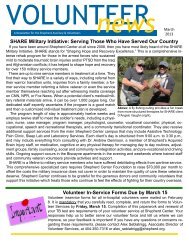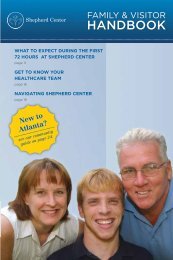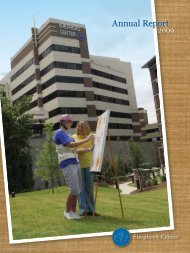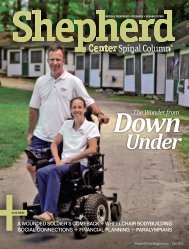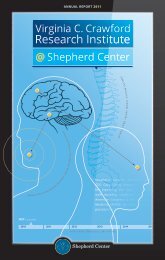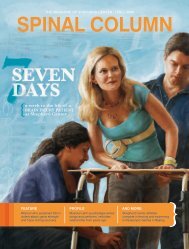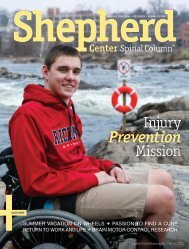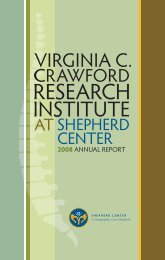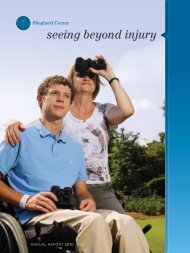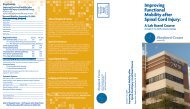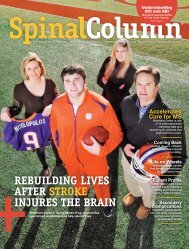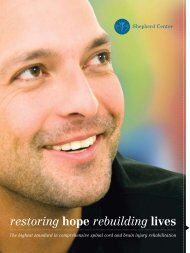INJURED - Shepherd Center
INJURED - Shepherd Center
INJURED - Shepherd Center
You also want an ePaper? Increase the reach of your titles
YUMPU automatically turns print PDFs into web optimized ePapers that Google loves.
trauma care<br />
Crisis results from a race against time and<br />
distance with no trauma system in place.<br />
Crisis in Georgia<br />
By Amanda Crowe, MA, MPH<br />
Dialing 9-1-1 in some parts of Georgia, particularly the<br />
rural south, may reveal a tragic reality that many may find<br />
unthinkable in modern society. For people who sustain<br />
catastrophic, potentially life-threatening injuries, there may<br />
be no emergency medical care in the immediate area.<br />
Even worse, there are large geographic areas that have no designated<br />
trauma centers – hospitals with the resources and medical specialists<br />
to handle the most severe injuries. Yet, rapid response from emergency<br />
medical technicians by ground or air, and the distance to the nearest<br />
trauma center are critical factors in saving lives and lessening the likelihood<br />
of permanent disability.<br />
“We don’t have a lot of time to make the right diagnosis and coordinate<br />
care, and patients in these areas are being brought to hospitals with<br />
not nearly the expertise that is needed,” says David Feliciano, M.D.,<br />
surgeon-in-chief at Grady Memorial Hospital in Atlanta, one of only 15<br />
trauma centers in Georgia that voluntarily meet guidelines from the state<br />
and American College of Surgeons’ Committee on Trauma.<br />
“Traumatic injury is random; it can happen to anyone at anytime,” Dr.<br />
Feliciano says. “It’s a daily threat to everyone in a state without a system<br />
in place.”<br />
A small window exists during which traumatic injury can be successfully<br />
treated to prevent premature death and disability. This “golden<br />
hour,” as it is called, begins when the traumatic event occurs, and every<br />
minute lost puts lives in jeopardy.<br />
“If you get hurt in southern Georgia, the ‘golden hour’ of trauma<br />
– which we know saves lives and gives better odds of a critical injury<br />
having better outcomes – is stretched,” says Kathy Slonaker, B.S., R.N.,<br />
<strong>Shepherd</strong> <strong>Center</strong>’s admissions liaison for south Georgia. “Every minute<br />
and mile counts.”<br />
A Public Health Threat<br />
Trauma is a major public health problem. It is a leading cause of death<br />
and disability worldwide, and the number four killer in the United<br />
States behind cardiovascular disease, stroke and cancer. According to the<br />
National <strong>Center</strong> for Injury Prevention and Control, traumatic injuries are<br />
the leading cause of death among people under the age of 44. Georgia<br />
has one of the highest death rates from traumatic injury; as many as 700<br />
lives could be saved each year if the state’s death rate improved to the<br />
national average.<br />
Also, the trauma crisis seriously threatens rehabilitation outcomes for<br />
catastrophic injuries, including brain and spinal cord injuries. For every<br />
person who dies, many more are left with permanent, life-changing disability<br />
because of delayed or inadequate trauma care, experts say.<br />
“We absolutely need to focus on saving lives, but the tale not being<br />
told is about the number of patients who survive. Their long-term prognosis<br />
and outcomes are greatly compromised because they didn’t receive<br />
emergency care quickly enough,” Slonaker says. For patients with possible<br />
spinal cord injury, early immobilization and rehabilitative services to<br />
minimize physical impairment is essential, she adds.<br />
Trickle-Down Effect<br />
As facilities drop trauma services, designated trauma centers are getting<br />
more patients with traumatic injury and seeing a simultaneous increase<br />
in the acuity level, says Grace Rozycki, M.D., director of trauma/surgical<br />
critical care at Grady. Patient care is more complex nowadays because<br />
people often have co-morbidities, are taking multiple medications, and<br />
run the gamut of injuries and care needed. Hospitals have expanded their<br />
intensive care units (ICU), but many still don’t have enough beds for<br />
critically ill patients. This trend reinforces the importance of getting the<br />
right patient to the right hospital at the right time, Dr. Rozycki says.<br />
The trauma crisis in Georgia also has affected <strong>Shepherd</strong> <strong>Center</strong>.<br />
“The loss of trauma units has placed an increased burden on hospitals<br />
that offer (trauma) services and, in turn, <strong>Shepherd</strong>,” explains Andrew<br />
Zadoff, M.D., medical director of <strong>Shepherd</strong>’s ICU. “Patients are arriving<br />
at <strong>Shepherd</strong> sicker and sicker.”<br />
What’s Needed?<br />
Severely injured patients need immediate access to specialized surgeons,<br />
physician specialists, anesthesiologists, nurses, and resuscitation and lifesupport<br />
equipment.<br />
“We need an organized, efficient trauma system so all citizens have access<br />
to the best possible care,” says Dennis Wayne Ashley, M.D., chairman<br />
of the Georgia Trauma Care Network Commission and chief of trauma<br />
care at the Medical <strong>Center</strong> of Central Georgia in Macon. “And it’s not one<br />
hospital, it’s not one stakeholder, this issue affects everyone in our state.”<br />
In 2007, Georgia lawmakers created the Commission, and they are<br />
likely to debate the trauma care issue in the 2009 legislative session.<br />
Advocates for a statewide trauma system stress that uniform, coordinated<br />
trauma services should be available, regardless of the severity of injury,<br />
geographic location or population density.<br />
12 Spinal column<br />
www.shepherd.org



